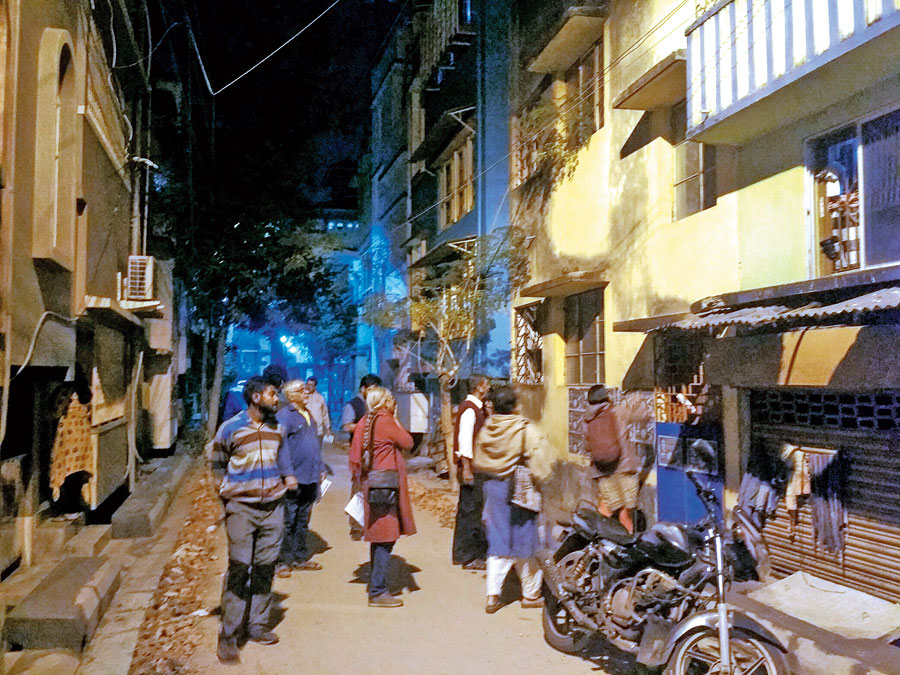A neighbourhood off the EM Bypass in Patuli had a small group of people knocking every door one evening last week.
The group, Humans of Patuli, was in the middle of a door-to-door campaign against the new citizenship thrust, distributing pamphlets and “explaining the perils” of the Citizenship (Amendment) Act, National Register of Citizens and the National Population Register.
The Telegraph accompanied them for over an hour. There was hardly a dull moment.
Chanda conundrum
The doorbell of a three-storey building rang twice at 8pm. “Ke (who is that)?” asked a woman from the second-floor balcony. The streetlight in front of the house was defunct and the speaker’s face was barely visible.
“Aamra kichhu parar lok, mashima (we are residents of the neighbourhood, aunty),” answered a member of the group. “Chanda (subscription)?” came the second question. The group below broke into a giggle.
“No, we haven’t come to collect chanda. We want to discuss something with you,” the member replied, following which the woman came down and opened the door.
“The process to prepare the National Population Register starts in April. You will be asked all sorts of questions — parents’ place of birth, last address and mother tongue. If the government is not satisfied with your answers, you will be regarded a doubtful citizen… 19 lakh people have been excluded from the National Register of Citizens in Assam. A majority of them are women and children,” a campaigner explained.
The resident of the house gave them a patient hearing, occasionally nodding her head. She took the pamphlet and asked for another one. “For a family that lives in the same building,” she said, pointing to a locked door on the ground floor.
Who are ‘We’?
A young woman, a bag slung across her shoulders, was walking hurriedly when the group gave her a pamphlet. The woman stopped, read the pamphlet for a few seconds and told the group: “I am in favour of the CAA”. Asked why, she said: “We will have access to more jobs if outsiders are driven out.”
“And who are ‘We’?” a member of the group asked. The woman, who studies at a college in Garia, said that by “We” she meant the “legal residents of India”.
The campaigner asked her whether she had ever voted. “Yes. I have voted once,” the student replied.
The campaigner seized on the opportunity. “The Constitution says that only Indian citizens are allowed to vote. That means whoever has a voter card is a legal citizen of this country. Do you agree?” she asked the student, who seemed fumbling for an answer. A dialogue started and continued for 10 minutes.
“My mother does not have a birth certificate…. Truth is I don’t know much about the NPR. Many others, too,” she said.
“Please read the pamphlet in detail. It also has our contact numbers. Please call us if you have any confusion or if you want to debate anything. There is no rhetoric. Everything we have written can be substantiated with government documents,” said another campaigner.
Final word
A little girl came running when the group rang the doorbell of the ground floor of a two-storey house. Seeing the large group, she ran back with equal speed and came with her mother.
Told about the purpose of the group’s visit, the mother said her husband would be the right person to talk to. “Call him. But you stay as well. Please. This is very important and you are an equal stakeholder,” a group member said. By the time he finished, the husband was at the door.
After explaining the “threats” of the new citizenship regime, the group member said: “Let’s say the authorities are not satisfied with your answers and mark you as a doubtful citizen…. You then have to prove your citizenship within 90 days by showing documents before 1971. Will you be able to produce such papers?”
The man looked a tad lost. “Honestly, I had never given this a serious thought,” he murmured. “You should,” the campaigner said, handing him a pamphlet.
At another house, an aged woman with a slight limp told the group that “BJP members had come eight to 10 days ago to campaign for the CAA”.
“Does that mean they will have the final word?” a senior citizen from the group asked. “No. It does not. But we have to remain united for that,” the resident of the house told the group with a smile.










